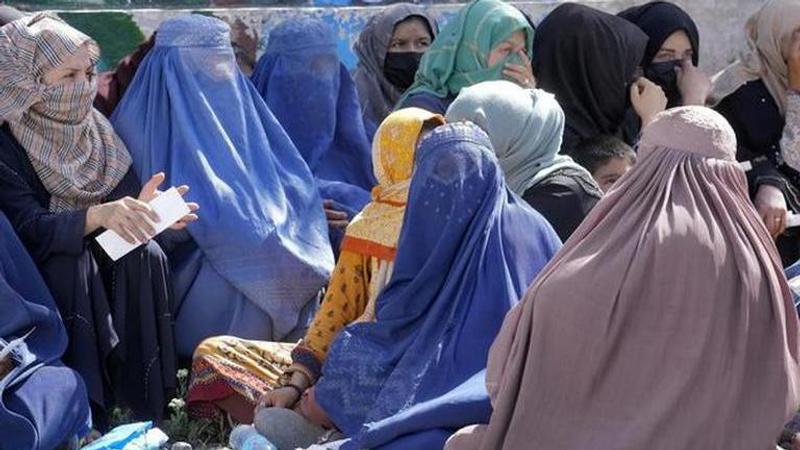Published 17:46 IST, April 22nd 2023
Taliban bans women from Eid celebrations: Tracing the group's ideological roots
Widespread celebrations are anticipated across Afghanistan to mark the end of Ramadan. However, women won't be able to participate in these celebrations.

Widespread celebrations are anticipated across Afghanistan to mark the end of Ramadan. However, women won't be able to participate in these celebrations. The Taliban has issued bans on women participating in Eid gatherings in two districts. Notices from local Taliban leaders in Baghlan district in northern Afghanistan and Takhar district in the northeast have stated that "it is forbidden for women to go out in groups during the days of Eid ul-Fitr", as per a report from the Independent. These orders are limited to the two districts and do not apply to the entirety of Afghanistan. This development follows the Taliban's recent imposition of restrictions that prohibit families and women from visiting restaurants with gardens or green spaces in Herat province in northwestern Afghanistan.
A senior official stated that the ban on women visiting restaurants with gardens was implemented in response to complaints from religious scholars and members of the public who opposed gender mixing in such spaces. Hibatullah Akhundzada, the elusive top leader of Afghanistan, released his Eid message to the country in five languages including Arabic, Dari, English, Pashto, and Urdu.
Taliban's top leader congratulates Taliban for making "progress"
In his Ramadan message, Mr. Akhundzada commended the Taliban for the "progress" made in Afghanistan since assuming control of the administration in August 2021. He claimed that the negative intellectual and moral effects of the 20-year occupation were coming to an end, and praised living according to Sharia, or Islamic law, as "living in the light." The leader is widely believed to have exerted significant influence in shaping domestic laws and policies in Afghanistan, including the controversial ban on girls' education beyond the sixth grade and the exclusion of Afghan women from public life and employment in non-governmental organizations and the United Nations.
Tracing Taliban's ideological roots
The Taliban is a militant Islamist group that emerged in the early 1990s in Afghanistan. The group's ideology and practices are influenced by the Deobandi movement, which originated in India in the late 19th century. The Deobandi movement was a Sunni Islamic revivalist movement that emerged in the town of Deoband, in present-day Uttar Pradesh, India, in 1866.
The movement was a response to British colonial rule in India and aimed to purify and reform Islamic beliefs and practices among Muslims in South Asia. The Deobandi scholars emphasised a strict interpretation of Sunni Islam based on the Quran and Hadith (sayings and actions of the Prophet Muhammad) and rejected what they perceived as innovations and practices that deviated from what they considered to be the authentic teachings of Islam. They rejected Bidah which translates into innovation.
The Deobandi movement gained popularity and spread across South Asia, including present-day Pakistan and Bangladesh. Its madrasas (Islamic seminaries) became centers for Islamic education, producing graduates who went on to become religious scholars, preachers, and leaders in their communities. The Deobandi scholars also advocated for Islamic law (Sharia) as the basis of governance and social order.
In the 1980s, during the Soviet invasion of Afghanistan, the Deobandi scholars and madrasas played a significant role in supporting the Afghan resistance against the Soviets. Afghan refugees who fled to Pakistan for safety received education and training in Deobandi madrasas, which became a source of religious and ideological inspiration for the Afghan mujahideen fighters.
After the Soviet withdrawal from Afghanistan in 1989, the Afghan civil war erupted, and various factions vied for power. In this chaotic environment, the Taliban emerged as a powerful force in the mid-1990s. Many of the Taliban leaders and fighters were products of Deobandi madrasas in Pakistan and had been deeply influenced by the Deobandi ideology.
The Taliban, led by Mullah Omar, seized power in Afghanistan in 1996 and implemented a strict interpretation of Sunni Islam based on Deobandi principles. They imposed their version of Sharia law, which included harsh punishments such as amputations and executions, and enforced strict social codes, particularly for women. Music, movies, and television were banned, and cultural practices that did not align with the Taliban's strict interpretation of Islam were suppressed.
Updated 19:22 IST, April 22nd 2023




